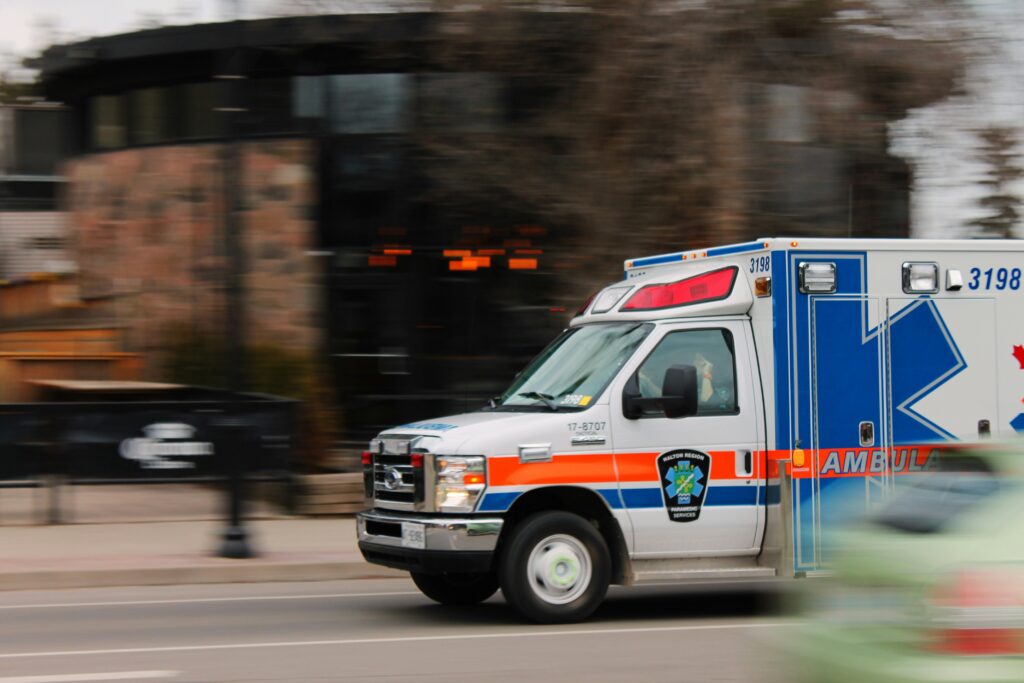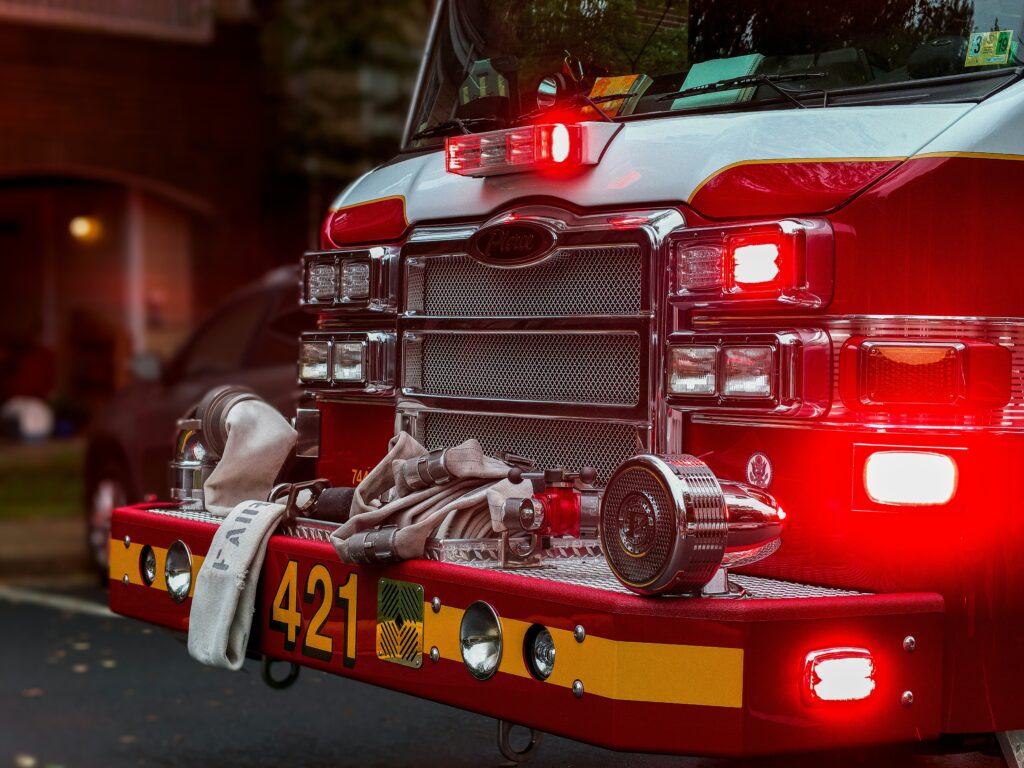
Deciding “should I go to the hospital after a car accident” can have significant implications for both your well-being and any legal claims. It’s not uncommon for injuries to remain hidden until after the adrenaline fades, potentially leading to severe complications. Immediate medical attention is crucial.
Key Takeaways
Always prioritize seeking medical attention immediately after a car accident, as some injuries may not be immediately apparent.
Documentation of your injuries is critical for an insurance claim, so ensure you keep all medical records and be honest with health care providers about your condition.
Waiting too long to see a doctor after an accident can weaken your legal case and insurance claim due to contributory negligence laws, especially in Virginia.
Immediate Medical Attention: A Priority After a Car Accident
The dust has settled, and your first instinct might be to assess the damage to your car. But hold that thought—your first priority should be you. Seeking immediate medical treatment after a car accident is imperative, regardless of whether you feel unharmed. Those hidden enemies, internal injuries, are notorious for their ninja-like stealth, taking days or weeks to manifest. Brushing off that headache or that twinge in your back? Not the best idea. Trust us, you don’t want to play roulette with your health.
From low back pain to traumatic brain injuries, the potential aftermath of an auto accident is no joke. Your first move, before considering insurance claims or vehicle repairs, should be to seek medical attention. If you’re not convinced, here are the reasons why you should.
Hidden Injuries and Their Risks
Ever heard of a wolf in sheep’s clothing? That’s exactly what hidden injuries from car accidents are like. They’re the soft tissue injuries, the internal bleeding, the concussions that don’t wave red flags immediately. These treacherous injuries can be life-threatening, lurking beneath the surface, ready to cause havoc days after the automobile accident.
Imagine spraining your wrist during the crash and brushing it off, only to find yourself unable to type or carry your morning coffee mug a week later. Not ideal, right? The risks of these unchecked injuries are real and can impact everything from your daily routine to your overall health.
The Importance of Documentation for Your Car Accident Claim
The role of documentation is the key to your car accident claim. Those medical records you collect after seeking medical attention? They’re gold—solid, irrefutable evidence that links your injuries directly to the car crash. They’re what stand between you and the insurance company that’s scrutinizing your claim, looking for any reason to minimize your financial compensation.
This documentation isn’t just a formality; it’s the narrative of your recovery, the proof of your personal injury claim that speaks volumes in court. Remember, honest communication with healthcare providers is crucial in ensuring your medical records accurately reflect your situation. So, whether it’s a visit to the ER or a follow-up with your trusty primary care doctor, remember that every detail documented is a step towards a fair settlement.
When to Call an Ambulance

What should you do in severe situations that go beyond a simple fender bender? When should you call an ambulance? The answer is simple: when there’s severe trauma, a loss of consciousness, or the collision was more like a scene from an action movie than a minor bump. In these cases, better safe than sorry is the motto to live by. Always err on the side of caution and assume injuries are significant until a medical professional tells you otherwise. Remember, that adrenaline pumping through your veins post-accident can be deceptive, masking injuries that could sneak up on you later.
Therefore, when in doubt, don’t hesitate to make the call. It could very well be the call that changes the trajectory of your recovery.
Understanding the Signs: When to Seek Hospital Care
Once you’ve ensured your immediate safety, it’s time to tune into your body’s signals. Not all injuries announce themselves with flashing lights and sirens; some prefer a more subtle approach. Take concussions, for instance—sneaky little things that might not make themselves known until later, potentially complicating your recovery.
If you’re experiencing persistent pain, swelling, or that annoying headache that just won’t quit, it’s time to consider a trip to the hospital. Also, pay attention to any new stiffness or loss of range of motion that you didn’t experience prior to the accident. These could be your body’s way of waving a red flag. Don’t ignore these signs; they’re not just inconveniences—they’re potential indicators of something more sinister.
Assessing Your Condition at the Scene
Imagine you’re at the scene of the car crash, your heart racing, mind buzzing. What now? Your first self-assigned mission, should you choose to accept it, is to assess your condition. Look for the tell-tale signs of injury: bleeding, breaks, immediate bruises. Feel any stiffness or pain in your limbs? That could be your body hinting at potential injuries, begging you not to dismiss them as mere discomforts.
However, remember that the adrenaline and endorphin rush in stressful situations might mask pain and injury. So, even if you feel alright, remember that some injuries are like uninvited guests—they show up late and without warning.
The Role of First Responders in Assessing Injury

Enter the first responders, the unsung heroes who arrive on the scene ready to triage and treat. These trained paramedics are your first line of defense, adept at evaluating and treating lacerations or other visible injuries. Their initial assessment is the cornerstone of ensuring victims get the treatment they need without delay, setting the stage for a swifter recovery.
Moreover, they’re trained to:
pick up on subtle symptoms that might hint at more severe issues
recommend whether you need to see a doctor or make a beeline for the nearest hospital
triage victims to ensure they get the attention they need without overwhelming local medical facilities
When they arrive, rely on their expertise—they’re trained for this.
Long-Term Health Consequences of Untreated Injuries
Fast forward to the future, and let’s talk consequences—specifically, the long-term health kind that come from untreated injuries after car accidents. Whiplash might sound like a dance move, but it’s far from fun when it leaves you with arm pain, neck pain, and headaches for the unforeseeable future. And then there are spinal cord injuries, the stealthy villains that, if not detected early, can lead to numbness or even paralysis over time.
Think of untreated herniated discs as time bombs of chronic pain, nerve damage, and mobility loss that could have been diffused with prompt medical attention. Also, remember that untreated soft tissue injuries can develop into chronic pain, affecting your daily life. The message is clear: Ignoring injuries today can mean a world of pain tomorrow, both literally and metaphorically.
Insurance Considerations and Hospital Visits
Navigating the murky waters of insurance claims post-accident can be as daunting as the accident itself, but it’s a critical part of the car accident narrative. Seeking medical attention promptly not only speeds up your recovery but also streamlines the insurance claim process, ensuring that you have the evidence needed to back up your personal injury case.
Seeing a doctor within a few days of the car accident is advisable to document your health status and prevent potential issues with your insurance claim. Delaying medical attention gives insurance companies the upper hand, providing them with ammunition to deny or dispute your claim, arguing that the severity of your injuries isn’t as dire as you state.
Plus, it’s worth noting that if you’re hit by an uninsured motorist, your own auto liability insurance might come to the rescue—provided you haven’t opted out of such coverage.
Dealing with Insurance Company Disputes
A promise that we make to every one of our personal injury clients is that once they sign on with BenGlassLaw as their car accident attorney, they’ll never have to deal with the insurance company again.
This burden is huge, as a major issue in the insurance claim process are the disputes with insurance companies. Insurance adjusters are known to question everything from the severity of your injuries to the necessity of the treatments you received. In Virginia, the law tends to side with the accident victim, presuming that medical charges are justified—yet insurers may still challenge these costs, prompting a legal tussle. They may also try to shift blame onto you, digging into your past medical records in an attempt to attribute fault, making strategic legal representation not just helpful, but essential.
And beware the siren song of early settlement offers; these tempting propositions often fail to cover ongoing treatment costs or unforeseen complications down the road — another reason why having an experienced personal injury on your side is vital.
Navigating Coverage for Medical Bills
Let’s demystify the complexity of medical bill coverage. In Virginia, drivers are required to have insurance that covers medical expenses related to car accidents. This typically means leveraging your own health insurance for immediate costs while waiting for the at-fault driver’s insurance to kick in. Then there’s Med-Pay, the unsung hero of auto insurance policies that covers medical expenses up to the policy limits, regardless of who’s at fault, and without the need for repayment even if you receive compensation elsewhere.
But what if you don’t have medical insurance at the time of the accident? Fear not, you can still pursue compensation for your medical expenses and other damages, like pain and suffering or lost wages.
Legal Implications of Post-Accident Hospital Visits
Recovery often entails legal considerations, particularly in relation to hospital visits following a car accident. These visits are key to establishing a clear and direct link between the incident and the injuries you’ve sustained, an essential element for a personal injury claim. Procrastinating on getting medical treatment can weaken your case, casting doubt on the true cause and severity of your injuries and ultimately affecting the outcome of your litigation.
Personal injury attorneys, including car accident lawyers, become your navigators in this journey, spearheading negotiations with insurance companies and ensuring your rights are upheld for a just compensation. In the state of Virginia, the strict contributory negligence law adds another layer of complexity; even a 1% of fault on your part can block your path to recovering damages, highlighting the importance of legal guidance in these situations.
Contributory Negligence and Your Case
Contributory negligence is a legal landmine that can obliterate your chances of recovering damages if you’re found even slightly at fault for the accident. Imagine being denied compensation because you waited too long to seek medical care, giving rise to arguments that your injuries aren’t as severe or aren’t related to the accident—frustrating, right? That’s the harsh reality of contributory negligence.
Staying consistent with your treatment plan and keeping meticulous medical records is crucial; any inconsistencies can be exploited to weaken your injury claim by questioning the connection between your injuries and the car crash. But fear not, with clear evidence and adept legal assistance, contributory negligence claims can be contested, and you can fight for your right to recovery.
Gathering Evidence for Your Entire Case
Remember, gathering comprehensive evidence for your case is crucial. This is where things like police reports and damage assessments come into play, serving as cornerstones to establish fault and fend off contributory negligence claims. A skilled lawyer doesn’t just represent you in court; they’re your detective, collecting documents, managing negotiations, and allowing you to focus on what truly matters—your recovery.
In Virginia, the law requires you to report car accident cases involving injury, death, or significant property damage, making it crucial to document and report your accident correctly. And a word to the wise: keep your lips sealed about the accident and your case to anyone but your attorney to avoid jeopardizing your claim.
Steps to Take After a Car Accident Before Hospitalization
The actions you take immediately after a car accident can have a significant impact on your health and any subsequent legal proceedings. The first steps taken after the accident depend on the severity of your injuries, but there are some critical steps to take that can safeguard your rights and set the stage for a smoother recovery process.
The very first thing? Call the police to the scene to get an official report filed, as this will become a pivotal document for any future claims. And while it might be tempting to start pointing fingers or taking the blame, it’s crucial to remain neutral—stick to the facts and give an objective account of events. In the chaos that follows a car crash, these steps can feel overwhelming, but they’re the bedrock of your road to recovery and justice.
Documenting the Scene and Exchanging Information
In today’s digital era, your smartphone is a powerful tool for documenting the accident scene. Snapping photos of your injuries, the vehicles involved, and the surrounding environment can significantly strengthen your personal injury claim. Make sure to capture multiple angles of all vehicles, the road conditions, traffic signs, and any immediate property damage.
But don’t stop there—jot down the details while they’re fresh in your mind. Exchange crucial information such as:
names
addresses
phone numbers
insurance details
with all drivers, passengers, and witnesses present. These steps aren’t just about due diligence; they’re about arming yourself with proof and ensuring your narrative holds up in the face of scrutiny.
Contacting a Car Accident Lawyer for a Free Consultation
After the dust has settled and you’ve documented the scene, it’s time to consider your legal options for an experienced auto accident attorney. A wise step would be to consult with a Fairfax car accident lawyer for a free consultation. Why? Because determining fault and navigating the legal system can be a complex maze. An expert can guide you through the maze, maximizing your chances of a fair compensation.
Plus, with no upfront costs, seeking legal advice is a risk-free step that can greatly impact the success of your case. So, don’t hesitate—pick up the phone and call our team today to tap into the expertise that could make all the difference in your pursuit of justice and recovery.
Summary
So there you have it—the comprehensive playbook for navigating the tumultuous aftermath of a car accident. From the critical importance of immediate medical attention to the intricacies of insurance claims and legal strategies, we’ve covered it all. Remember, the steps you take in the wake of a collision can have profound implications on both your health and your legal rights.
Frequently Asked Questions
Should I go to the ER for whiplash?
Yes, if you experience symptoms of whiplash after a neck injury, it’s important to seek medical attention in an emergency room as soon as possible. Without delay, this can help ensure prompt and appropriate treatment for your condition.
How long do I have to see a doctor after a car accident in Virginia?
You should see a doctor right away after a car accident in Virginia, ideally on the same day as the collision, to quickly diagnose any injuries and receive necessary treatments.
Should I still go to the doctor after a car accident if I feel fine?
Yes, you should still go to the doctor after a car accident, as hidden injuries can be deceptive, and symptoms may not appear immediately. Seeking medical attention can help uncover any injuries and provide essential documentation for your case.
BenGlassLaw Virginia Personal Injury Attorneys
The BenGlassLaw process is designed to make this as easy as possible for you and your loved ones so that you can focus on recovery. For every single personal injury case that our team takes on, we have three promises that we are always focused on (and they’re what sets us apart from other firms):
We find all the pots of insurance money that might be available to you and pull as much money as possible out of those pots.
We are great at finding insurance money. Our lawyers do a thorough examination of available insurance coverage by looking at: the driver, the owner of the car, family members, employers, your auto policy, and your health insurance. We leave no stone unturned to find every dollar that we can.
Help you keep as much of that money as possible.
Some health insurance plans are entitled to reimbursement at the end of injury cases. Some health insurance plans say that they are, even when they aren’t! We help you keep as much of your money as we can. If you do not have health insurance, we can often negotiate discounts with your medical providers.
Make this process as simple and easy for you as we can.
The auto insurance industry wants this process to be complicated. They want it to be difficult for you to understand who should pay, when they should pay, and how much they should pay. Our team of lawyers simplifies this whole process for you. After you hire us, we stop the insurance company from calling you and your only job is to get medical care and tell us where you got it. We take care of everything else.
Last but not least, most people think that they must pay an attorney upfront to engage their services. That’s not the case with BenGlassLaw. We don’t get paid unless we get money for you.
Contact us today to learn how we can use our years of experience and reputation dealing with auto accident injury claims to help you move forward.
